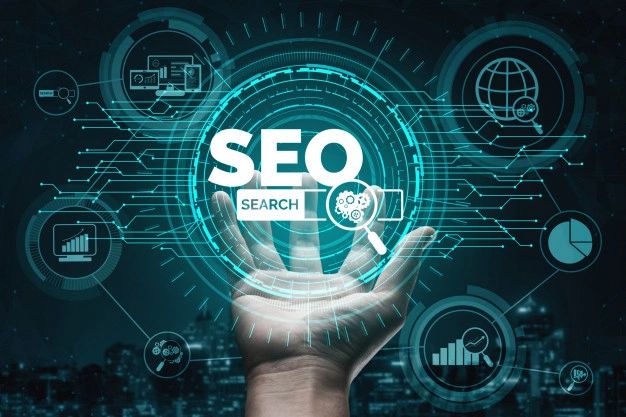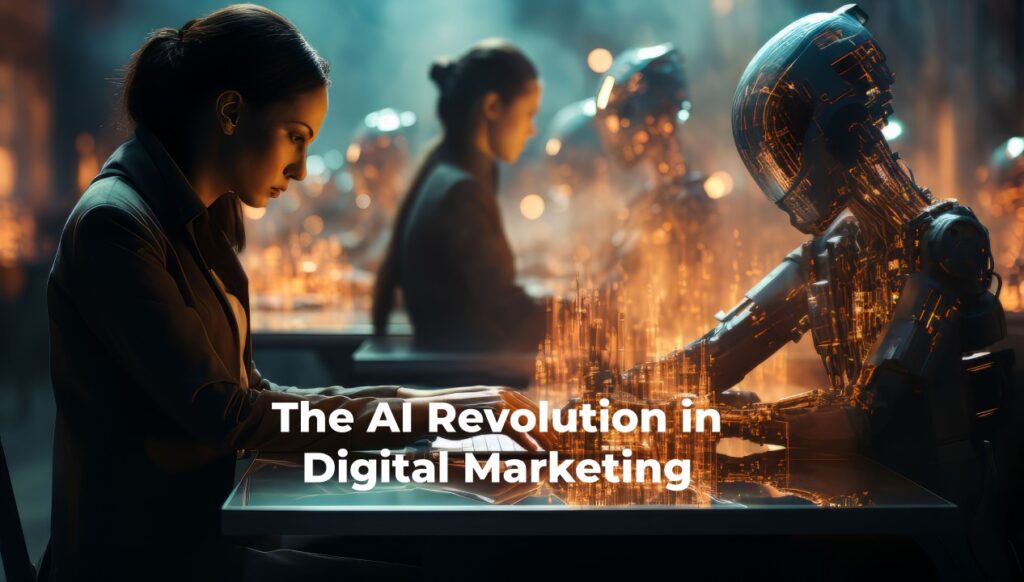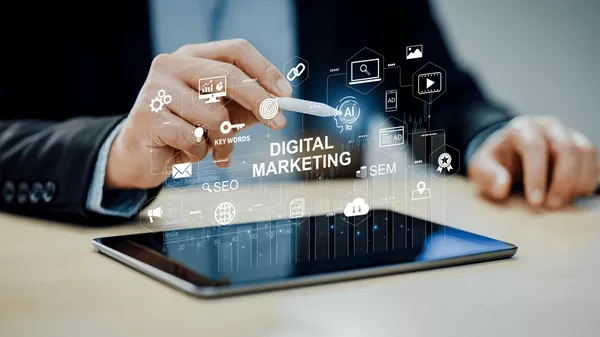Refining Your SEO Approach to Navigate the Evolving Landscape of 2025

Team Animax Global Author All Posts Our Recent Blogs January 26, 2025 Refining Your SEO Approach to Navigate the Evolving Landscape of 2025 Read More Posted By Team Animax Global January 17, 2025 Boosting Real Estate Success: The Power of Digital Marketing Read More Posted By Team Animax Global January 15, 2025 How AI is Revolutionizing Digital Marketing in 2025 Read More Posted By Team Animax Global 1 2 Next Boosting Real Estate Success: The Power of Digital Marketing Team Animax Global January 15, 2025 AI in Digital Marketing, Artificial Intelligence in Marketing, Content Marketing Strategies, Customer Experience and AI, Digital Marketing Trends, Future Marketing Innovations, Marketing Automation, SEO and AI Integration, Technology in Marketing Search Engine Optimization (SEO) continues to be a cornerstone of digital marketing success, but in 2025, the rules of the game are shifting more dynamically than ever. With constant algorithm updates, advances in AI, and changing user behaviors, businesses must rethink their SEO strategies to stay ahead. Here’s how you can refine your approach to meet the challenges of the evolving SEO landscape this year. 1. Embrace AI-Driven Search Artificial Intelligence (AI) is transforming how search engines understand and rank content. With tools like Google’s RankBrain and advancements in natural language processing (NLP), search engines are better equipped to understand user intent. To keep up: Focus on creating content that addresses specific user queries and needs. Use AI tools to analyze trends and identify content opportunities. Optimize for conversational search to align with how users phrase queries in voice and text searches. 2. Prioritize E-A-T Expertise, Authoritativeness, and Trustworthiness (E-A-T) remain crucial for ranking well. In 2025, building credibility is non-negotiable: Publish content backed by data and authored by credible experts. Enhance your site’s trust signals, such as secure HTTPS, updated privacy policies, and testimonials. Build quality backlinks from authoritative sources in your industry. 3. Optimize for Voice Search Voice search continues to grow as users rely on virtual assistants like Siri, Alexa, and Google Assistant. To capture this audience: Use natural, conversational keywords in your content. Optimize for long-tail keywords and question-based queries. Structure your content using FAQ formats and schema markup to improve voice search visibility. 4. Focus on Core Web Vitals Google’s emphasis on user experience through Core Web Vitals (loading, interactivity, and visual stability) will remain a critical ranking factor. Ensure your site: Loads quickly, even on mobile devices. Has minimal layout shifts and provides a seamless user experience. Is responsive and mobile-friendly to cater to users on the go. 5. Capitalize on Visual Search With the rise of platforms like Google Lens, visual search is gaining traction. To leverage this trend: Optimize images with descriptive file names and alt text. Use high-quality, relevant visuals in your content. Implement image sitemap and structured data to improve discoverability. 6. Leverage Local SEO Local SEO is evolving, and businesses targeting local customers must adapt: Keep your Google Business Profile updated with accurate information. Use location-specific keywords in your content. Encourage customers to leave reviews and engage with your profile actively. 7. Create Interactive and Engaging Content Interactive content, such as quizzes, polls, and infographics, is becoming more critical to engage users and reduce bounce rates. Aim to: Provide value-added, shareable content. Integrate multimedia elements like videos and interactive widgets. Align your content with your audience’s preferences and pain points. 8. Monitor Algorithm Updates Search engines are continually updating their algorithms. Stay informed by: Following official announcements from Google and other search engines. Regularly auditing your website to ensure compliance with the latest updates. Using analytics tools to track changes in traffic and ranking patterns. Final Thoughts The SEO landscape in 2025 is a mix of new technologies, user preferences, and search engine innovations. By refining your SEO approach to align with these changes, you can maintain a competitive edge and drive meaningful results for your business. Adaptability is key, and those who stay proactive in understanding and implementing the latest trends will thrive. Start evolving your SEO strategy today to navigate the challenges and opportunities that lie ahead. AI for SEO Optimization AI in Content Marketing AI in Digital Marketing 2025 AI Marketing Automation AI Tools for Marketers AI-Driven Customer Experiences AI-Powered Marketing Strategies Artificial Intelligence Trends 2025 Digital Marketing Trends 2025 Emerging AI Technologies in Marketing Future of Digital Marketing Personalized Marketing with AI Predictive Analytics in Marketing Revolutionizing Digital Marketing with AI Voice Search Optimization with AI Leave a Reply Cancel reply Logged in as Team Animax Global. Edit your profile. Log out? Required fields are marked * Message*
How AI is Revolutionizing Digital Marketing in 2025

Team Animax Global Author All Posts Our Recent Blogs January 15, 2025 How AI is Revolutionizing Digital Marketing in 2025 Read More Posted By Team Animax Global January 12, 2025 Social Media and AI: How Technology is Transforming Engagement Read More Posted By Team Animax Global January 12, 2025 AI and Voice Search Optimization: Revolutionizing SEO Read More Posted By Team Animax Global 1 2 Next AI and Voice Search Optimization: Revolutionizing SEO Team Animax Global January 15, 2025 AI and Voice Search Optimization, AI in Digital Marketing, Content Marketing Strategies, Digital Marketing, Emerging Marketing Trends, Search Engine Optimization (SEO), SEO Best Practices, Voice Search Techonology The digital marketing landscape has seen rapid evolution in recent years, and 2025 marks a pivotal moment as Artificial Intelligence (AI) solidifies its place as a game-changer. From personalized customer experiences to data-driven decision-making, AI is reshaping how brands connect with their audiences. Let’s explore the top ways AI is revolutionizing digital marketing this year. 1. Hyper-Personalized Customer Experiences Consumers today expect brands to understand their preferences and deliver tailored solutions. AI-driven algorithms analyze user behavior, search history, and real-time interactions to create hyper-personalized experiences. Tools like AI chatbots engage customers with contextual and dynamic responses. Personalized email campaigns now boast higher open rates, thanks to AI-powered segmentation. 2. Smarter Content Creation and Optimization Content remains king, but AI is the wizard behind the throne in 2025. AI writing tools generate blog posts, ad copies, and product descriptions in minutes. Predictive analytics guide marketers on the type of content that will resonate with their target audience. Real-time content optimization improves search engine rankings, ensuring brands stay visible. 3. Enhanced Visual Search Capabilities With advancements in image recognition, visual search is trending upward. AI-powered platforms like Google Lens allow users to search for products by snapping a picture. Brands leveraging visual search SEO are witnessing increased organic traffic and conversion rates. 4. Advanced Audience Insights with Predictive Analytics Predictive analytics powered by AI allows marketers to forecast trends and customer needs. By analyzing historical data and current market behavior, AI predicts what products or services customers will want next. This approach improves ad targeting, reduces costs, and boosts ROI. 5. Voice Search and Conversational Marketing Voice search is more popular than ever, thanks to AI-driven assistants like Alexa, Google Assistant, and Siri. Optimizing for voice search has become crucial for SEO strategies in 2025. Conversational marketing powered by AI ensures seamless customer interactions, fostering brand loyalty. Why Businesses Must Adapt to AI in Digital Marketing AI is not just a passing trend; it’s the foundation for future marketing strategies. Businesses that fail to embrace AI risk falling behind in a hyper-competitive market. From small startups to global enterprises, the adoption of AI tools is now essential to staying relevant. Conclusion As we dive deeper into 2025, the integration of AI into digital marketing is no longer optional—it’s imperative. By harnessing AI’s capabilities, brands can unlock new levels of efficiency, creativity, and customer satisfaction. Whether you’re just starting or looking to optimize your existing strategies, now is the time to embrace AI and transform your digital marketing game. Ready to explore the power of AI in your digital marketing strategy? Contact us at Animax Global today! Advanced SEO Strategies AI and SEO Integration AI and Voice Search Optimization AI for Voice Search Optimization AI in Digital Marketing 2025 AI-powered SEO Techniques Conversational AI for Marketing Digital Marketing with AI Future of SEO Trends Next-Gen SEO Practices Optimizing for Voice Assistants Revolutionizing SEO with AI Voice Search Revolution in SEO Voice Search SEO Tips Voice Search Technology Leave a Reply Cancel reply Logged in as Team Animax Global. Edit your profile. Log out? Required fields are marked * Message*
Social Media and AI: How Technology is Transforming Engagement

Team Animax Global Author All Posts Our Recent Blogs January 12, 2025 Social Media and AI: How Technology is Transforming Engagement Read More Posted By Team Animax Global January 12, 2025 AI and Voice Search Optimization: Revolutionizing SEO Read More Posted By Team Animax Global January 11, 2025 The Rise of AI in Digital Marketing: How to Stay Ahead Read More Posted By Team Animax Global 1 2 Next AI and Voice Search Optimization: Revolutionizing SEO Team Animax Global January 11, 2025 AI in Digital Marketing, All, Marketing Social media platforms have evolved from basic networking sites to powerful ecosystems that influence buying behavior, shape opinions, and drive brand growth. Central to this evolution is Artificial Intelligence (AI), which is revolutionizing how businesses and consumers interact online. This blog explores the key advancements in AI for social media and provides actionable strategies to leverage these innovations for enhanced engagement. The Role of AI in Social Media AI powers numerous behind-the-scenes processes that make social media platforms efficient and user-friendly. Here are some ways AI is integrated: Content Recommendations: Algorithms analyze user preferences, engagement patterns, and browsing history to suggest personalized content, keeping users hooked. Example: YouTube’s AI-powered “For You” page offers hyper-personalized videos, leading to increased user retention. Ad Targeting: AI optimizes ad placement by analyzing audience behavior, ensuring that ads reach the right people at the right time. Example: Facebook Ads Manager uses AI to create lookalike audiences, maximizing ad effectiveness. Image and Video Recognition: AI processes visual content for categorization, tagging, and search functionality. Example: Instagram’s AI detects objects in photos to enhance its Explore page and ad targeting. Chatbots and Automated Messaging: AI chatbots streamline customer service by providing instant responses and resolving common queries. Example: Sephora’s chatbot on Messenger helps customers find products and book appointments. Key Advancements in AI for Social Media Predictive Analytics: AI uses historical data to forecast trends, enabling brands to stay ahead of the curve. How to Use: Monitor emerging hashtags and topics with tools like Hootsuite Insights or Sprout Social. Create content aligned with predicted trends to capture early engagement. Sentiment Analysis: AI can gauge public sentiment around a brand or topic by analyzing social media conversations. How to Use: Use tools like Brandwatch or NetBase to understand customer emotions. Respond proactively to negative sentiment and amplify positive feedback. Content Creation and Curation: AI assists in generating and recommending content tailored to audience preferences. Example: Tools like Canva’s AI features and Jasper AI help design visuals and write captions for social media posts. AI-Driven Influencer Marketing: AI identifies the right influencers for campaigns by analyzing engagement metrics, audience demographics, and relevance. How to Use: Platforms like AspireIQ and Upfluence use AI to connect brands with influencers who align with their goals. Real-Time Engagement Analysis: AI evaluates the performance of posts in real-time, suggesting adjustments to improve reach and interaction. How to Use: Use real-time analytics tools to tweak ad targeting, posting schedules, or content format. Benefits of AI in Social Media Marketing Improved Personalization: AI tailors content and ads to individual preferences, resulting in higher engagement rates. Increased Efficiency: Automation tools handle repetitive tasks like scheduling posts, freeing up time for strategy and creativity. Enhanced Customer Insights: AI analyzes vast amounts of data to uncover patterns in customer behavior, helping refine marketing strategies. Better ROI: AI ensures that marketing budgets are spent efficiently by targeting the right audience and optimizing campaigns. How to Leverage AI for Social Media Success Use AI-Powered Scheduling Tools: Platforms like Buffer and Hootsuite optimize post timings for maximum visibility. Example: Schedule posts based on when your audience is most active to boost engagement. Experiment with AI Content Tools: Tools like Lumen5 and Adobe’s Sensei can help create high-quality videos and graphics quickly. Example: Turn blog posts into engaging video snippets for Instagram or LinkedIn. Monitor Performance with Analytics: Use AI-driven insights to measure the success of your campaigns. Example: Track KPIs like reach, impressions, and conversion rates using tools like Socialbakers. Invest in Social Listening: Social listening tools powered by AI allow you to track brand mentions, industry trends, and competitor activity. Example: Identify opportunities to engage with customers or join trending conversations to increase visibility. Integrate Chatbots: Deploy AI chatbots on platforms like Messenger or WhatsApp to handle queries and provide support. Example: Create a chatbot that guides users through product recommendations based on their preferences. Challenges of Using AI in Social Media Data Privacy Concerns: Collecting user data for AI analysis must comply with regulations like GDPR and CCPA. Initial Costs: Investing in AI tools and training can be expensive for small businesses. Over-Automation Risks: Relying too heavily on AI may result in content that lacks a personal touch. Constant Updates: AI technology evolves rapidly, requiring businesses to stay updated to remain competitive. Future Trends in AI and Social Media Augmented Reality (AR) Integration: AI-driven AR filters and experiences will become more common on platforms like Instagram and Snapchat. Voice-Powered Interactions: Voice assistants will enable users to navigate social media through voice commands. AI-Powered Content Moderation: Enhanced AI algorithms will detect harmful content and maintain safe online environments. Hyper-Personalized Ads: AI will refine ad targeting to include real-time behavioral cues and preferences. Conclusion AI is a transformative force in social media, enabling brands to engage with audiences more effectively and efficiently. By leveraging tools for content creation, sentiment analysis, influencer marketing, and real-time performance tracking, businesses can stay ahead in the competitive digital landscape. As technology continues to evolve, adopting AI-driven strategies will be essential to maximize social media’s potential and foster meaningful connections with customers. AI Content Creation AI in Digital Marketing AI Tools for Businesses Artificial Intelligence Trends Benefits of AI in Marketing Challenges of AI Implementation Chatbots and Virtual Assistants Chatbots in Marketing Digital Marketing Innovations Future of Digital Marketing Marketing Automation Marketing Automation Tools Marketing Technology Personalized Marketing Strategies Predictive Analytics Predictive Analytics in Marketing Leave a Reply Cancel reply Logged in as Team Animax Global. Edit your profile. Log out? Required fields are marked *
AI and Voice Search Optimization: Revolutionizing SEO

Team Animax Global Author All Posts Our Recent Blogs January 12, 2025 Social Media and AI: How Technology is Transforming Engagement Read More Posted By Team Animax Global January 12, 2025 AI and Voice Search Optimization: Revolutionizing SEO Read More Posted By Team Animax Global January 11, 2025 The Rise of AI in Digital Marketing: How to Stay Ahead Read More Posted By Team Animax Global 1 2 Next AI and Voice Search Optimization: Revolutionizing SEO Team Animax Global January 11, 2025 AI in Digital Marketing, All, Marketing Voice search has rapidly become a dominant force in digital interactions, driven by the rise of smart speakers, voice assistants, and improved AI technologies. With devices like Amazon Alexa, Google Assistant, and Siri transforming how people search for information, optimizing for voice search is no longer optional for businesses aiming to stay competitive. This blog explores the impact of voice search on SEO strategies and provides actionable insights to adapt your marketing efforts effectively. The Growth of Voice Search Voice search usage has skyrocketed in recent years. Here are some key statistics: By 2025, it is estimated that over 50% of all online searches will be conducted through voice. The global smart speaker market reached $35.6 billion in 2023, showcasing increasing consumer reliance on voice-enabled devices. A significant 71% of consumers prefer to perform queries by voice instead of typing when possible. The convenience and speed of voice search have made it a preferred method for consumers to interact with technology, forcing businesses to re-evaluate their SEO practices. How Voice Search Differs from Traditional Search Voice search optimization requires a different approach compared to text-based search. Key differences include: Natural Language Queries: Voice searches are conversational and often phrased as questions. For example, instead of typing “best Italian restaurant NYC,” a user might ask, “What is the best Italian restaurant near me?” Long-Tail Keywords: Voice queries tend to be longer and more specific than text searches. This requires targeting long-tail keywords in your SEO strategy. Local Intent: A significant proportion of voice searches have local intent, such as “Where can I get coffee nearby?” Optimizing for local SEO is crucial. Featured Snippets: Voice assistants often pull answers directly from featured snippets on search engines. Appearing in these snippets can greatly increase visibility. Voice Search and SEO: Key Strategies Optimize for Conversational Keywords: Focus on long-tail and question-based keywords. Use tools like AnswerThePublic or SEMrush to identify common questions your target audience asks. Incorporate these keywords naturally into your website’s content. Example: Instead of targeting “cheap laptops,” optimize for “What are the best affordable laptops under $500?” Create FAQ Pages: Develop detailed FAQ sections addressing common questions in your industry. Use concise, direct answers to increase the chances of being featured in snippets. Example: If you’re a florist, include FAQs like “How can I keep my flowers fresh longer?” or “What flowers are best for birthdays?” Focus on Local SEO: Claim and optimize your Google My Business (GMB) profile. Ensure your business name, address, and phone number (NAP) are consistent across all platforms. Encourage customers to leave reviews, as these are critical for local voice searches. Example: For a local bakery, optimizing for phrases like “Where can I find fresh croissants near me?” can attract more customers. Enhance Website Speed and Mobile-Friendliness: Voice search users often access results on mobile devices. Ensure your website is mobile-responsive. Use tools like Google PageSpeed Insights to optimize load times. Example: Compress large images and enable browser caching to improve site speed. Structure Data for Featured Snippets: Use schema markup to help search engines understand your content. Include clear headings, bullet points, and concise answers. Example: A recipe blog can use structured data to display cooking times, ingredients, and steps directly in search results. The Role of AI in Voice Search Optimization AI technologies play a significant role in the evolution of voice search. Here’s how AI influences optimization: Natural Language Processing (NLP): AI-driven NLP algorithms, like those used by Google’s BERT and MUM updates, enhance the understanding of conversational queries. To align with NLP trends, write content that mimics natural speech patterns. Content Personalization: AI analyzes user behavior and preferences to deliver personalized search results. Tailor your content to meet the specific needs of your target audience. Voice App Integration: Develop voice apps or skills for smart devices to engage users directly. For example, Domino’s created a voice-ordering feature for Alexa, streamlining the customer experience. Measuring the Success of Voice Search Optimization To evaluate the impact of your voice search strategy, track these metrics: Organic Search Rankings: Monitor your ranking for conversational and long-tail keywords. Snippet Performance: Check how often your content appears in featured snippets. Local Search Visibility: Measure clicks, calls, and directions from your GMB profile. Website Analytics: Analyze mobile traffic and page load times. The Future of Voice Search As AI continues to advance, voice search will become even more integrated into our daily lives. Future trends include: Voice Commerce: More consumers will use voice search to make purchases. Optimizing your e-commerce site for voice queries will be critical. Multimodal Search: Devices will combine voice with visual search, offering richer search experiences. Increased AI Accuracy: Advances in AI will make voice search more precise, understanding complex queries and delivering nuanced answers. Final Thoughts Voice search optimization is a game-changer in the digital marketing landscape. By adapting your SEO strategy to align with conversational queries and AI-driven technologies, you can stay ahead in this fast-evolving space. Start by focusing on long-tail keywords, local SEO, and enhancing your website’s speed and structure. With the right approach, you’ll capture the growing audience of voice search users and ensure your business remains competitive in the digital era. AI Content Creation AI in Digital Marketing AI Tools for Businesses Artificial Intelligence Trends Benefits of AI in Marketing Challenges of AI Implementation Chatbots and Virtual Assistants Chatbots in Marketing Digital Marketing Innovations Future of Digital Marketing Marketing Automation Marketing Automation Tools Marketing Technology Personalized Marketing Strategies Predictive Analytics Predictive Analytics in Marketing Leave a Reply Cancel reply
The Rise of AI in Digital Marketing: How to Stay Ahead

Team Animax Global Author All Posts Our Recent Blogs January 12, 2025 Social Media and AI: How Technology is Transforming Engagement Read More Posted By Team Animax Global January 12, 2025 AI and Voice Search Optimization: Revolutionizing SEO Read More Posted By Team Animax Global January 11, 2025 The Rise of AI in Digital Marketing: How to Stay Ahead Read More Posted By Team Animax Global 1 2 Next The Rise of AI in Digital Marketing: How to Stay Ahead Team Animax Global January 14, 2025 AI in Digital Marketing, All, Marketing Artificial Intelligence (AI) has emerged as a transformative force in digital marketing, offering unparalleled opportunities to enhance personalization, improve efficiency, and boost overall campaign performance. In an increasingly competitive landscape, businesses leveraging AI effectively can gain a significant edge over their competitors. This blog delves into how AI is reshaping marketing strategies and provides actionable steps to integrate AI into your campaigns. What is AI in Digital Marketing? AI in digital marketing refers to the use of machine learning algorithms, data analytics, and automation tools to improve customer experiences, streamline operations, and deliver targeted marketing. From predictive analytics to chatbots, AI applications are vast and evolving rapidly. Key Trends in AI-Driven Marketing: Personalization at Scale: AI enables hyper-personalized experiences by analyzing customer data and predicting behavior. Advanced tools like Dynamic Yield and Persado create tailored content that resonates with individual preferences. For instance, e-commerce platforms use AI to recommend products based on browsing history and purchase behavior, enhancing user satisfaction and driving sales. Example: Netflix uses AI algorithms to suggest movies and shows based on viewing history, increasing user engagement and retention. How to Implement: Leverage tools like HubSpot or Salesforce to collect and analyze customer data. Use AI-driven platforms to segment audiences and deliver personalized email campaigns or product recommendations. AI-Powered Content Creation: Content creation is no longer limited by human bandwidth. AI tools like ChatGPT and Jasper AI can generate high-quality blog posts, social media captions, and ad copy within seconds. This allows marketers to maintain a consistent content calendar while focusing on strategy and creativity. Example: Coca-Cola used AI to create marketing copy for its “Share a Coke” campaign, generating thousands of personalized messages for customers. How to Implement: Identify repetitive content needs in your marketing strategy and use AI tools to fill the gap. For blogs and articles, AI can help with ideation, drafting, and even optimization for SEO. Advanced Predictive Analytics: Predictive analytics tools identify trends and customer behavior patterns, allowing businesses to make proactive decisions. AI analyzes historical data to forecast sales, identify high-value customers, and optimize ad spend. Example: Amazon’s predictive analytics helps in inventory management and personalized recommendations, resulting in higher conversion rates. How to Implement: Invest in platforms like Google Analytics 4, Tableau, or Looker Studio that integrate AI-driven insights. Use these tools to anticipate customer needs and refine your marketing campaigns accordingly. Chatbots and Virtual Assistants: AI-driven chatbots enhance customer service by providing instant responses and solving queries 24/7. These virtual assistants reduce response time, improve user experience, and free up human resources for complex tasks. Example: Sephora’s chatbot on Facebook Messenger provides makeup tutorials, product recommendations, and even books appointments for customers. How to Implement: Integrate chatbots on your website or social media platforms. Tools like Drift, Tidio, and Intercom allow you to create customizable chatbots tailored to your brand’s tone and style. The Benefits of AI in Marketing: Enhanced Efficiency: Automating repetitive tasks like email campaigns and data analysis saves time and resources. Improved Accuracy: AI minimizes human errors in data analysis and targeting, resulting in more precise campaigns. Better Customer Insights: AI provides deeper understanding of customer preferences and behavior, enabling businesses to create meaningful connections. Challenges of Implementing AI in Digital Marketing: High Initial Costs: AI tools and platforms often require significant investment. Data Privacy Concerns: Collecting and analyzing large amounts of customer data must comply with privacy laws like GDPR and CCPA. Learning Curve: Teams may need extensive training to effectively use AI tools. Actionable Tips to Stay Ahead: Invest in AI Tools Tailored to Your Industry: Start small with tools that address specific challenges in your marketing strategy. For example, use Grammarly’s AI for content editing or Hootsuite Insights for social media analytics. Train Your Team: Equip your marketing team with knowledge about AI tools and their potential. Offer training sessions and encourage experimentation with AI applications. Balance Automation with a Human Touch: While AI can handle repetitive tasks, ensure your campaigns maintain authenticity by adding a personal, human touch. This builds trust and fosters deeper connections with your audience. Stay Updated on AI Trends: AI technology evolves rapidly. Follow industry blogs, attend webinars, and join forums to keep up with the latest developments. Test and Optimize: Regularly test AI-driven campaigns and analyze their performance. Use A/B testing to identify what works best and optimize accordingly. The Future of AI in Digital Marketing: The role of AI in digital marketing is expected to grow exponentially. From voice search optimization to AI-generated virtual influencers, the possibilities are limitless. Businesses that embrace AI today will be better positioned to lead tomorrow. By integrating AI into your marketing strategy, you can unlock new opportunities to connect with your audience, drive growth, and stay ahead of the competition. Whether you’re a small business or a global enterprise, AI has the potential to revolutionize your marketing efforts and deliver measurable results. What Is GDPR Privacy Policy? What Is CCPA Privacy Policy? AI Content Creation AI in Digital Marketing AI Tools for Businesses Artificial Intelligence Trends Benefits of AI in Marketing Challenges of AI Implementation Chatbots and Virtual Assistants Chatbots in Marketing Digital Marketing Innovations Future of Digital Marketing Marketing Automation Marketing Automation Tools Marketing Technology Personalized Marketing Strategies Predictive Analytics Predictive Analytics in Marketing Leave a Reply Cancel reply Logged in as Team Animax Global. Edit your profile. Log out? Required fields are marked * Message*
